Memory Performance: 16GB DDR3-1333 to DDR3-2400 on Ivy Bridge IGP with G.Skill
by Ian Cutress on October 18, 2012 12:00 PM EST- Posted in
- Memory
- G.Skill
- Ivy Bridge
- DDR3
As we go up the memory speeds, moving from 1333 to 1600 to 1866 means that the next stop is DDR3-2133. DDR3-2133 will be the next checkpoint for processors to accept by default in the future, and as a result there is a price premium for all memory kits equal and above this mark. In our case, the G.Skill F3-17000CL9Q-16GBZH comes in at $130, some $35 more than the DDR3-1866 kit. That is quite a hefty chunk, adding 37% on the price of memory for only a 14.3% increase in absolute MHz value terms. As we will see in the memory benchmarks later, the 2133 MHz point does offer improvements over the 1866 kit, but not by as much as 37%.
Visual Inspection
In the land of G.Skill and kit naming, RipjawsZ is the last step in the Ripjaws line before we hit Trident. The Ripjaws naming scheme was devised in anticipation of the Sandy Bridge and Sandy Bridge-E processor lineup where the majority of processors can achieve the speeds of all of the Ripjaws kits. The look of the RipjawsZ kits are less edge-driven than the RipjawsX, with a rounded module end, but more bulk in terms of heatsink with the top edge still being ~1cm taller than the module. This causes issues when paired with large heatsinks, despite large heatsinks being the aim of the processors paired with this kit.
Again, the test with this module in a large heatsink environment gives us the following:
JEDEC + XMP Settings
| G.Skill | |||||
| Kit Speed | 1333 | 1600 | 1866 | 2133 | 2400 |
| Subtimings | 9-9-9-24 2T | 9-9-9-24 2T | 9-10-9-28 2T | 9-11-10-28 2T | 10-12-12-31 2T |
| Price | $75 | $80 | $95 | $130 | $145 |
| XMP | No | Yes | Yes | Yes | Yes |
| Size | 4 x 4 GB | 4 x 4 GB | 4 x 4 GB | 4 x 4 GB | 4 x 4 GB |
|
|
|||||
| MHz | 1333 | 1600 | 1867 | 2134 | 2401 |
| Voltage | 1.500 | 1.500 | 1.500 | 1.650 | 1.650 |
| tCL | 9 | 9 | 9 | 9 | 10 |
| tRCD | 9 | 9 | 10 | 11 | 12 |
| tRP | 9 | 9 | 9 | 10 | 12 |
| tRAS | 24 | 24 | 28 | 28 | 31 |
| tRC | 33 | 33 | 37 | 38 | 43 |
| tWR | 10 | 12 | 14 | 16 | 16 |
| tRRD | 4 | 5 | 5 | 6 | 7/6 |
| tRFC | 107 | 128 | 150 | 171 | 313 |
| tWTR | 5 | 6 | 8/7 | 9/8 | 10/9 |
| tRTP | 5 | 6 | 8/7 | 9/8 | 10/9 |
| tFAW | 20 | 24 | 24 | 25 | 26 |
| tCWL | - | 7 | 7 | 7 | 7 |
| CR | - | 2 | 2 | 2 | 2 |


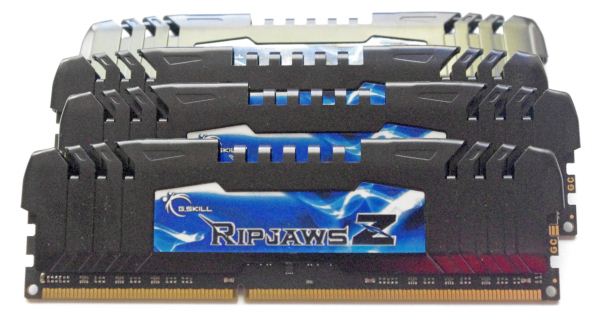
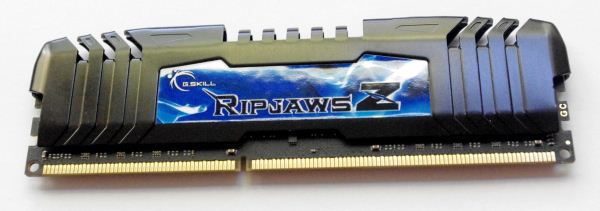
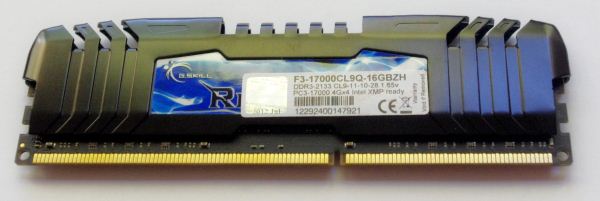

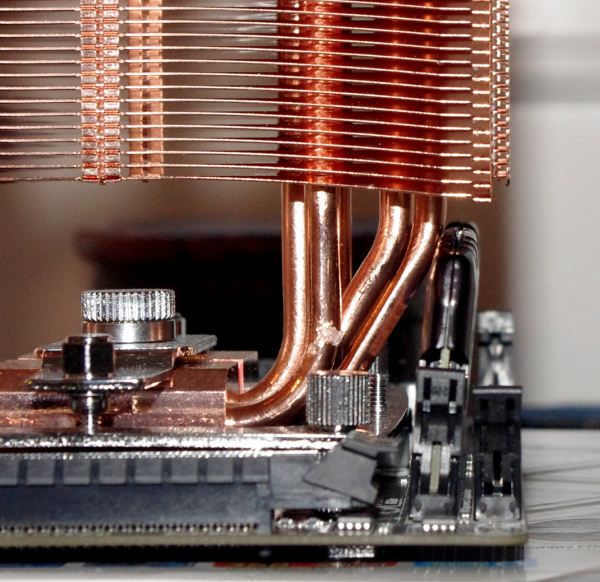






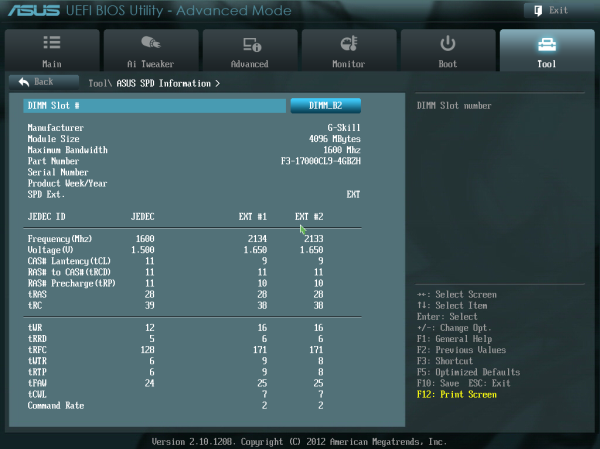








114 Comments
View All Comments
Peanutsrevenge - Friday, October 19, 2012 - link
Thanks Ian.Well, except for making me feel ludicrously old, first memory kit of 4GB DDR2?
Mine was back in SIMM days, when I think I added an 8MB 72pin stick to my existing 4MB stick.
Although the external math co-processor might have come first.
And I'm only 31.
You shall now always be Dr Evil Cutress to me.
IanCutress - Friday, October 19, 2012 - link
First *purchased* memory kit. I dealt with plenty of older memory thanks to hand me downs or prebuilt systems from my family at the time. I still have some SDRAM around somewhere, or some 8MB sticks of something or other. It's in a box under the desk ;)Haha, I've been called worse :D
Ian
alpha754293 - Friday, October 19, 2012 - link
I would have figured that with a memory test/benchmarking that you would be running Stream test.And with all this talk about the various latencies (measured in clock cycles) - a) a comparison should be given between the theorectical calculations and the actual performance and b) that you would think that you'd use something like lmbench in order to try to better quantify/test that (in addition to the actual games, tools, and applications).
Most of the results are pretty much inconclusive since the standard deviation is within the margin of error.
IanCutress - Friday, October 19, 2012 - link
Main reason is to steer away from synthetics. Synthetics frustrate me so - they will easily show the difference between a 1600 C9 and 2400 C10 kit, but what is that difference in real life? If latencies and burst speeds are x% difference in the synthetic, does that actually make a difference when playing Portal 2? Hence the requirement of this review to focus on the practical rather than the synthetic.Regarding being within standard deviations, the results you see are the culmination of multiple tests. The standard deviations are actually quite low as the results are enormously repeatable. I did a science doctorate, I make sure my numbers are valid.
Ian
Tchamber - Friday, October 19, 2012 - link
Back in 2009 I picked up a 3x2GB kit of Mushkin DDR3 1600 with timings of 6-7-6-18. Why don't we see low latency like that any more?IanCutress - Friday, October 19, 2012 - link
Those were linked to different types of memory chips at the time - the Elpida 'Hyper' ICs (http://www.anandtech.com/show/2799). Nice speeds, but high fail rates and low yields. They have been replaced by chips that are slightly slower, but a lot more reliable. Also to note that those Elpida Hyper kits worked great with Clarkdale and Nehalem, but are poor with Sandy Bridge and Ivy Bridge.Ian
CherryBOMB - Friday, October 19, 2012 - link
Can you explain why you say Hyper' IC's are " are poor with Sandy Bridge and Ivy Bridge."As I stated "I have 16gb of the fastest money could buy around that era running on x79 @ 1666 6-6-6-18-1t right now."
This was a tri channel run >
http://www.overclock.net/t/872945/top-30-3d-mark-1...
post #1054
IanCutress - Saturday, October 20, 2012 - link
Because Hyper ICs fell out of favor, motherboard manufacturers are now reluctant to spend time in optimizing the Hyper IC kits to work with their systems. Thus the kits often have to fall back onto default settings, and they sometimes do not work. As one set of ICs is phased out, and new ICs come in, the newer ICs get priority.Ian
PS. You'll find me on the overclock.net HWBot team :)
CherryBOMB - Friday, October 19, 2012 - link
I have 16gb of the fastest money could buy around that era running on x79 @ 1666 6-6-6-18-1t right now.well over $1000 invested. Each 6gb kit was over $450 - bought the extra to future proof to quad lanes today.
2x CMT6GX3M3A1600C6
1x CMT4GX3M2A1600C6
http://www.newegg.com/Product/Product.aspx?Item=N8...
http://www.newegg.com/Product/Product.aspx?Item=N8...
saturn85 - Friday, October 19, 2012 - link
how about adding a folding on cpu benchmark with different memory speed?